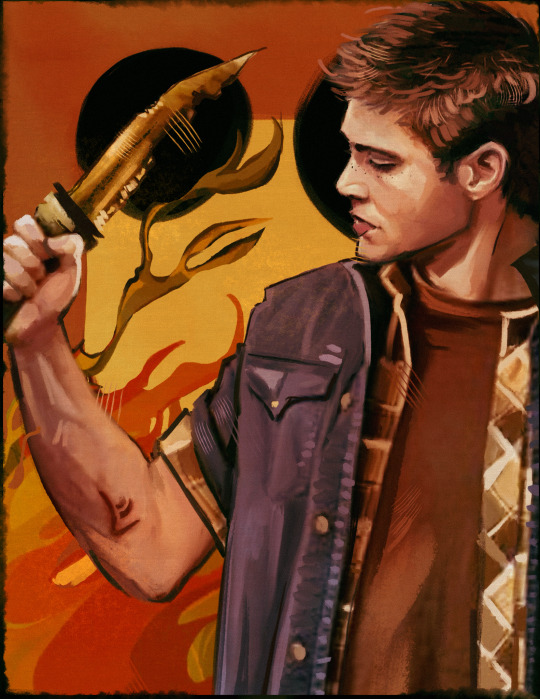Don't wanna be here? Send us removal request.
Text
I would actually love a Renaissance AU simply for the aesthetics.
Sam’s rosewood hair and velvet-broad shoulders. A little notebook on a golden chain he wraps around his waist. Gloves to hide ink-stained hands and bruised knuckles. Reciting Baldassare Castiglione's Cortegiano, exorcisms or Catullus 16 as needed, with the same refined elegance.
Dean with his black cloak and the delicately ruffled shirt underneath, a golden necklace and the worn signet ring with initials that aren’t his. A dagger slipped up his sleeve and his hands rough from riding without gloves. Wine-sweet mouth and quicksilver hands when playing cards or undoing silk-covered buttons.
Castiel with cool Botticelli grace and colourful wings. That languid, detached elegance, pale throat and soft hands, startlingly clear eyes. Silent steps on marble and a faint golden light in dim rooms.
If they’re British, we could put earrings on them if I’m not mistaken? In Elizabethan times, men started wearing their hair short to show them off, at least. Dean taking his pearl earrings off before fucking shit up. Or, of course, gently nagging Sam to let him cut that unfashionable and impractical mane as he dips the comb in rose water, dragging it gentle-cool through brown curls with his fingertips brushing the nape of Sam's neck.
46 notes
·
View notes
Text
nothing scarier than being a fan of a fic and then becoming mutuals with the author. like hi shakespeare. big fan of your fake dating au
#fandom is my fandom#I also have ride or die fandom friends#I fully expect to retire with at least one of these lovely women
47K notes
·
View notes
Photo



87K notes
·
View notes
Photo




EW Halloween Cover [x]
3K notes
·
View notes
Text
Maybe it's just me as a Filipino who has lived through a murderous dictatorship and oligarchies in a queerphobic country controlled by the rich who brutalize grassroots pro worker movements all under the military abuse of US imperialism but...
You just gotta keep showing up. Support each other. Don't just fight for yourself. The work is hard, but you just gotta keep doing it. You'll always see results, even if they're not always the ones you want, or as big as you want them to be.
All your work always matters. Even if it doesn't feel like it at first. It always matters.
9K notes
·
View notes
Text
when a dragons wings are too small to realistically fly thats fine its reasonable i think to size them down to allow them to fit in a space better and be more readable as a character. but outside of really specific circumstances (like cartoonishly small wings) when a dragons wing webbing stops way too far up? punishable by death. in seymourworld.
17K notes
·
View notes
Text
This week, I read a fic that was around 20 years old, which had originally been posted on the author's personal website and which she added to AO3 a few years ago. She listed her email address with the fic, so after I finished reading, I sent her an email saying how much I enjoyed the story, how much I appreciated the work and effort she obviously put into it, and thanked her for uploading it to AO3. She responded the next day and thanked me for my message, then said she had a few more stories in the same series that she hadn't gotten around to uploading. I checked this morning--she added a 35,000 word novella and thanked me in the summary.
👏 comment 👏 on 👏 old 👏 fics 👏
77K notes
·
View notes
Text
Concept: cursed blade rehabilitation center. Destroying a sentient weapon is expensive and highly unethical, so adventurers bring them to the center where highly trained staff can care for them and eventually find them forever homes. It turns out most cursed weapons are products of trauma and are not strictly evil themselves. Some blades turn out to be fiercely protective companions. Others don't even want to be weapons at all, finding joy in simple work like blacksmithing or farming. Most blades just need to be loved.
42K notes
·
View notes
Text
ANYWAY you cannot convince me that the air nomads didn’t have any sort of trade good based on the flying bison and aang just didn’t have the time or safety to make and sell any of these while trying to stop ozai. they probably did so much spinning just because drop spindles are super transportable, it’s something to do while flying long distances, there’s always a weaver somewhere willing to buy yarn, and there’s always, always large amounts of shed fur just. around. look at how much came off of appa that one episode. so much fur
so three things happen the summer after ozai is defeated and appa starts shedding in earnest again
aang starts spinning and selling yarn because that’s What You Do and he’s clinging REAL HARD to every possible air nomad tradition because, well, who else will remember these things?
toph hears about this and scruffs him before he can sell too much because she’s a merchants daughter and holy shit aang do you understand what you’re selling?? yarn from the last known sky bison! the avatar’s own spirit guide!! spun by the avatars own hand!!!! what are you doing aang!!!!!! she has to drag katara in at this point because aang is real unhappy with the idea that his normal flying bison yarn of, uh, questionable quality is being sold to exclusive high class weavers so they can make shawls for filthy rich nobles for baaaaaank just on the basis of his name. this isn’t how the monks did it :/ and he doesn’t WANT a lot of money anyway! he’s a monk!! he only asks for what he needs to survive!! anyway katara manages to talk toph around to donating most of the money to reconstruction efforts, charities, and orphanages and convinces aang that having an emergency fund is a good thing and he should keep something. aang accidentally ends up with a reasonably full bank account and is really confused about how that happened, why it’s there, and what he’s supposed to do with it
there is a real weird period of time where it’s In Fashion for high noble ladies to have shawls and scarves dyed the same color as aangs clothes (because that’s how you know it’s made with special avatar yarn!) or have images of appa woven into them (can you imagine a shawl that’s just a full length body shot of appa?? amazing) and all the earth kingdom nobility are just rocking green and orange like nbd. weaving decorative shawls with slubby yarn becomes really in fashion, too, because aang is not great at spinning. he’s 13 and it’s boring, ok?
BONUS sokka is just. so mad. you could have been making bank with appa the whole time we were scrambling around the planet aang? do you realize how much more food we could have had? how many more hot baths?? how could you betray me like this
(probably the air nomads also did a lot of weaving but it was mostly the pregnant nuns and the really old nomads so it’s a little off aangs radar. and does aang eat cheese? it never comes up in series but I would also believe that the nomads made a lot of air bison cheese and bison butter tea)
#atla#fiber arts#so glad the undercoat come up!#fwiw I've tried the cashmere alternatives like yak#the best has still been high end cashmere or high end merino#best means softest here#but you can get pretty close
33K notes
·
View notes
Text
The classic story: Or All the Seas with Oysters, Avram Davidson.

56 notes
·
View notes
Photo


endless gifs of dean winchester - 10/∞
698 notes
·
View notes
Text

The Mark of Cain
2K notes
·
View notes
Text
it is weird that celiac stuff has become part of the 'culture war'. because it's literally just a medical thing.... I get super anemic unless I cut a certain protein out of my diet, because it bulldozes the villi in my intestines. but if I post about it, right-wingers send me gore images. I guess you can't expect shitty people to be logical, but I've even heard lefty people make fun of gluten stuff, and it's like why are you mad about this??? why are you pissed off that I'm eating bread that doesn't taste as good so that I can have blood in my body? it's so morally neutral.
29K notes
·
View notes
Text
why be radically exclusionary abt queerness when you could be radically inclusionary instead. let's inflate the numbers. let's become the majority. the sky's the limit
33K notes
·
View notes
Text
like no way he found an open door to sam's every thought and feeling for the first three years they were together and acted normal about it. no way he didnt threaten suicide over a "sam rolled his eyes while dean wasn't watching, frustrated". dean winchester i love you and you still keep a copy of mystery spot under your mattress
#spn#dean winchester#sam winchester#I think it's equally possible he couldn't handle it!#and pretended it didn't exist#because between knowing sam and being known#the latter is pretty terrifying
164 notes
·
View notes
Text

does one get to say 'first post' if one donates so early in the fundraising campaign it still claims $0 have been raised?
102 notes
·
View notes
Text
It really is crazy how if you mention you write fanfiction with people outside fandom, they're always like "you should change the names and try to sell it." It misses the point (fun), but more importantly to me, I get slightly (and I know irrationally) insulted on a craft level. Excuse me, my fanfic is entwined with the canon, thank you very much. I wish sometimes less entwined. You wouldn't believe the stupid bullshit some of my fics have to include because of canon.
11K notes
·
View notes